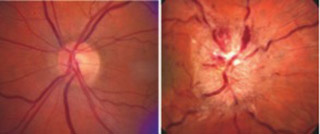
A clinical trial conducted by University of Iowa researchers and colleagues across the U.S. and Canada found that combining a glaucoma drug with a low-sodium, weight-reduction diet is better at treating vision loss caused by idiopathic intracranial hypertension (IIH) than weight loss alone. The study, published April 23 in JAMA, is the first to provide hard evidence that the drug acetazolamide (Diamox) improves vision outcomes in IIH.
Idiopathic intracranial hypertension, also known as pseudotumor cerebri, involves increased pressure around the brain and optic nerve. The condition, which mostly affects overweight, young women, causes vision loss and severe headaches.

“Our results show that acetazolamide can help preserve and actually restore vision for women with IIH, when combined with a moderate but comprehensive dietary and lifestyle modification plan,” says Michael Wall, a UI professor of neurology and ophthalmology and director of the Neuro-Ophthalmology Research Disease Investigator Consortium (NORDIC) study.
Acetazolamide is best known as a glaucoma drug. It has been commonly prescribed for IIH, but without much evidence that it helps. The NORDIC IIH Treatment Trial tested the benefits of acetazolamide plus a weight loss plan versus the weight loss plan with a placebo pill, over six months. One hundred and sixty one women and four men with IIH and mild vision loss participated in the study.
Patients in both treatment groups had improved vision, but those receiving the drug and diet had about twice the improvement of the placebo plus diet group. All patients were allowed to take headache medications throughout the trial, and both groups experienced a similar reduction in headache. The drug-weight loss combination also led to greater improvements in daily function and quality of life.
The study was funded by the National Eye Institute and conducted by the Neuro-Ophthalmology Research Disease Investigator Consortium. The results also will be presented May 2 at the American Academy of Neurology meeting in Philadelphia.
The JAMA study is online here.
Note to Editors: This release is adapted from news releases issued by JAMA and the National Eye Institute.